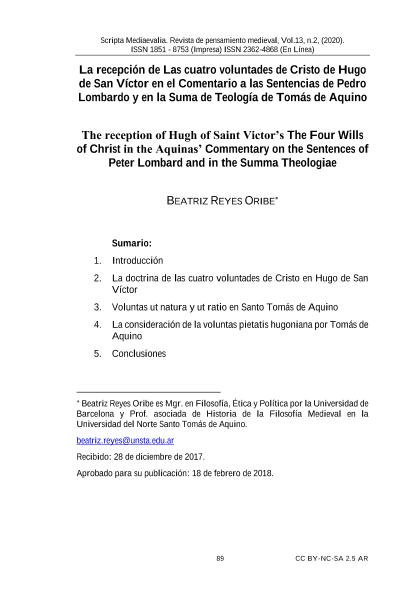Mostrar el registro sencillo del ítem
dc.contributor.author
Reyes Oribe, Beatriz Eugenia

dc.date.available
2022-10-03T11:29:47Z
dc.date.issued
2020-10
dc.identifier.citation
Reyes Oribe, Beatriz Eugenia; La recepción de Las cuatro voluntades de Cristo de Hugo de San Víctor en el Comentario a las Sentencias de Pedro Lombardo y en la Suma de Teología de Tomás de Aquino; Universidad Nacional de Cuyo. Facultad de Filosofía y Letras. Centro de Estudios Filosóficos Medievales; Scripta Mediaevalia; 13; 2; 10-2020; 89-108
dc.identifier.issn
1851-8753
dc.identifier.uri
http://hdl.handle.net/11336/171406
dc.description.abstract
Hugo de San Víctor escribe en su opúsculo Sobre las cuatro voluntades de Cristo que, dada la doble naturaleza del Señor, encontraremos en Él dos voluntades: la divina y la humana. Pero, aunque la voluntad divina es simple, la humana se presenta reflejando la complejidad de su naturaleza. De ahí que Hugo distingue en Cristo cuatro voluntades: la divina, la humana racional, la carnal y la voluntad de piedad –voluntas pietatis–. Es esta última la que aparece citada por el Aquinate en su Comentario a las Sentencias y en la Tercera Parte de la Suma de Teología. Podemos observar que Hugo va desgranando estas distinciones a la luz de la Escritura, aduciendo como prueba pasos del Evangelio con ejemplos de cada tipo de voluntad. Por su parte, Tomás se enfrenta al argumento basado en Hugo de que la voluntad de piedad sea voluntad ut ratio, por ello la identifica con la voluntas ut natura. El Angélico ve todos los aspectos no racionales como globalmente ut natura, sea porque siguen a la naturaleza, sea porque se capta naturalmente la conveniencia de algún bien, sin por ello negar la intervención del intelecto. Sin embargo en Hugo, la voluntas pietatis es voluntas humanitatis; es una voluntad característica del hombre en cuanto tal.
dc.description.abstract
Hugh of Saint Victor writes in his booklet On the four wills of Christ that, given the double nature of the Lord, we will find in him two wills: the divine will and the human will. But, although the divine will is simple, the human will presents itself reflecting the complexity of its nature. Hence Hugh distinguishes in Christ four wills: the divine, the rational human, the carnal and the will of piety -voluntas pietatis-. It is the latter that is mentioned by Thomas Aquinas in his Commentary on the Sentences and in the Third Part of the Sum of Theology. We can see that Hugh presents these distinctions in the light of Scripture, offering as proof the passages of the Gospel with examples of each type of will. For his part, Aquinas confronts the argument based on Hugh that the will of piety be voluntas ut ratio, for that reason he identifies it with voluntas ut natura. The Angelic doctor sees all the non-rational aspects as globally ut natura, either because they follow nature, or because the convenience of some good is naturally intuited. However, in Hugh, the voluntas pietatis is voluntas humanitatis; it is a characteristic will of man as such.
dc.format
application/pdf
dc.language.iso
spa
dc.publisher
Universidad Nacional de Cuyo. Facultad de Filosofía y Letras. Centro de Estudios Filosóficos Medievales
dc.rights
info:eu-repo/semantics/openAccess
dc.rights.uri
https://creativecommons.org/licenses/by-nc-sa/2.5/ar/
dc.subject
VOLUNTAS PIETATIS
dc.subject
VOLUNTAS UT NATURA
dc.subject
HUGO DE SAN VÍCTOR
dc.subject
TOMÁS DE AQUINO
dc.subject.classification
Filosofía, Historia y Filosofía de la Ciencia y la Tecnología

dc.subject.classification
Filosofía, Ética y Religión

dc.subject.classification
HUMANIDADES

dc.title
La recepción de Las cuatro voluntades de Cristo de Hugo de San Víctor en el Comentario a las Sentencias de Pedro Lombardo y en la Suma de Teología de Tomás de Aquino
dc.title
The reception of Hugh of Saint Victor’s The Four Wills of Christ in the Aquinas’ Commentary on the Sentences of Peter Lombard and in the Summa Theologiae
dc.type
info:eu-repo/semantics/article
dc.type
info:ar-repo/semantics/artículo
dc.type
info:eu-repo/semantics/publishedVersion
dc.date.updated
2022-09-29T18:01:05Z
dc.identifier.eissn
2362-4868
dc.journal.volume
13
dc.journal.number
2
dc.journal.pagination
89-108
dc.journal.pais
Argentina

dc.journal.ciudad
Mendoza
dc.description.fil
Fil: Reyes Oribe, Beatriz Eugenia. Consejo Nacional de Investigaciones Científicas y Técnicas; Argentina. Universidad del Norte "santo Tomas de Aquino". Facultad de Humanidades; Argentina
dc.journal.title
Scripta Mediaevalia
dc.relation.alternativeid
info:eu-repo/semantics/altIdentifier/url/https://revistas.uncu.edu.ar/ojs/index.php/scripta/article/view/3956
dc.relation.alternativeid
info:eu-repo/semantics/altIdentifier/url/http://www.scielo.org.ar/scielo.php?script=sci_arttext&pid=S1851-87532020000200004&lang=pt
Archivos asociados
